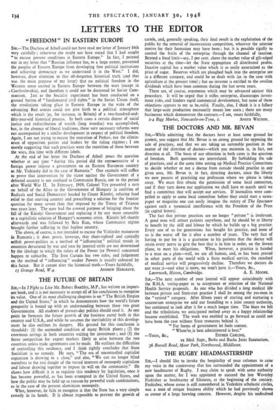THE FUTURE OF BRITAIN
Snt,—In I Fight to Live Mt Robert Boothby, M.P., has written an import- ant book, and it is not necessary to accept all of his conclusions to recognise its value. One of its most challenging chapters is on " The British Empire and the United States," in which he demonstrates how the world's future prosperity is bound up with an understanding between these two great Governments. All students of present-day politics should read it. At one point he forecasts the future growth of the business cartel both in this country-and U.S.A., and while he assumes the inevitability of this develop- ment he also outlines its dangers. His ground for this conclusion is threefold: (1) the outmoded condition of many British plants ; (2) the enormous savings in both countries waiting for investment ; and (3). the fierce competition for export markets likely to arise between the two countries unless trade agreements can be made. He outlines the difficulties of controlling this tendency, and I think rightly concludes that State Socialism is no remedy. He says, "The era of uncontrolled capitalist expansion is drawing to a close," and also, " We can no longer blind ourselves to the real danger of the vested interests of monopoly capitalism and -labour drawing together to impose its will on the community." He shows how difficult it is to regulate this tendency by legislation, once it has beCome powerful, as has been attempted in the United States, and how the public may be held up to ransom.by powerful trade combinations, as in the case of the present aluminium monopoly.
.What, however, he fails to recognise is that the State has a very simple remedy in its hands. It is almost impossible to prevent the growth of cartels, and, generally speaking, their final result is the exploitation of the public by the removal of inconvenient competition, whatever the anterior motive for their formation may have been ; but it is possible rigidly to control the fruits of the enterprise through the channel of taxation. Beyond a fixed limit—say, 2 per cent. above the market value of gilt-edged securities at the time—let the State appropriate all distributed profits. Inactive capital has a market value which is as easily ascertained as the price of sugar. Reserves which are ploughed back into the enterprise are in a different category, and could be so dealt with (as in the case with agriculture at the present time) ; but no investor is entitled to the swollen dividends which have been common during the last seven years.
There are, of course, arguments which may be advanced against this procedure. It will be urged that it stifles enterprise, discourages invest- ment risks, and hinders rapid commercial development, but none of these objections appears to me to be,valid. Finally, also, I think it is a fallacy that large-scale production necessarily means low costs ; there are many businesses which demonstrate the contrary.—I am, yours faithfully,
2-4 Bigg Market, Newcastle-on-Tyne, X. ANGUS WATSON.


































 Previous page
Previous page